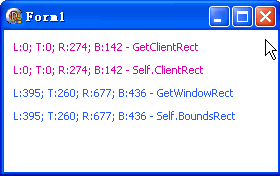获取窗口矩形的四种方法: GetClientRect、ClientRect、GetWindowRect、BoundsRect
其中 GetClientRect、ClientRect 获取的是窗口的客户区矩形;
GetWindowRect、BoundsRect 是获取窗口矩形;
另外, 还有一个 Windows.GetClientRect(使用方法同 GetWindowRect, 它们都是 API 函数),
这里使用的 GetClientRect 是 Forms.GetClientRect.
本例效果图:

GetWindowRect、BoundsRect 是获取窗口矩形;
另外, 还有一个 Windows.GetClientRect(使用方法同 GetWindowRect, 它们都是 API 函数),
这里使用的 GetClientRect 是 Forms.GetClientRect.
本例效果图:

unit Unit1;
interface
uses
Windows, Messages, SysUtils, Variants, Classes, Graphics, Controls, Forms,
Dialogs, StdCtrls;
type
TForm1 = class(TForm)
procedure FormCreate(Sender: TObject);
procedure FormPaint(Sender: TObject);
procedure FormResize(Sender: TObject);
end;
var
Form1: TForm1;
implementation
{$R *.dfm}
procedure TForm1.FormCreate(Sender: TObject);
begin
Color := clWhite;
end;
procedure TForm1.FormPaint(Sender: TObject);
const
str = 'L:%d; T:%d; R:%d; B:%d - ';
var
R1,R2,R3,R4: TRect;
buf: array[Byte] of Char;
x,y,h: Integer;
begin
R1 := GetClientRect;
R2 := Self.ClientRect;
GetWindowRect(Handle, R3);
R4 := Self.BoundsRect;
x := 10;
y := 10;
h := 10;
Randomize;
Canvas.Font.Color := Random($FFFFFF);
wvsprintf(buf, str + 'GetClientRect', @R1);
Canvas.TextOut(x, y, buf);
y := y + h + Canvas.TextHeight(buf);
wvsprintf(buf, str + 'Self.ClientRect', @R2);
Canvas.TextOut(x, y, buf);
y := y + h + Canvas.TextHeight(buf);
Canvas.Font.Color := Random($FFFFFF);
wvsprintf(buf, str + 'GetWindowRect', @R3);
Canvas.TextOut(x, y, buf);
y := y + h + Canvas.TextHeight(buf);
wvsprintf(buf, str + 'Self.BoundsRect', @R4);
Canvas.TextOut(x, y, buf);
end;
procedure TForm1.FormResize(Sender: TObject);
begin
Repaint;
end;
end.